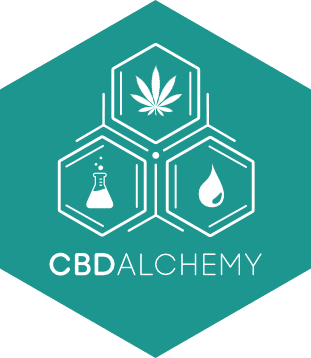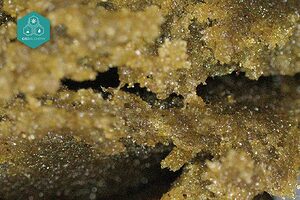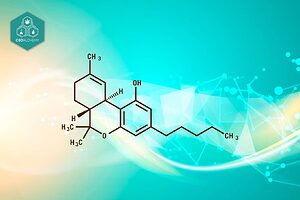CBD, which is a bioactive compound and a cannabinoid present in the cannabis plant, is known for its natural properties. It has gained popularity for not being psychotropic like THC. In this article, we will explore what CBD is, CBD oil, CBD flowers and its benefits, effects and risks.
Key Points
- CBD, or cannabidiol, is a non-psychoactive compound from the Cannabis sativa plant, which has demonstrated therapeutic properties without altering mental perception, and is one of many compounds present in this plant.
- CBD is used to treat various health conditions, including chronic pain, anxiety, and sleep disorders, highlighting its potential as a therapeutic alternative.
- Although CBD is generally safe, it can cause side effects and its legality varies by region, and it is essential to consider interactions with other medications before use.
Definition of CBD
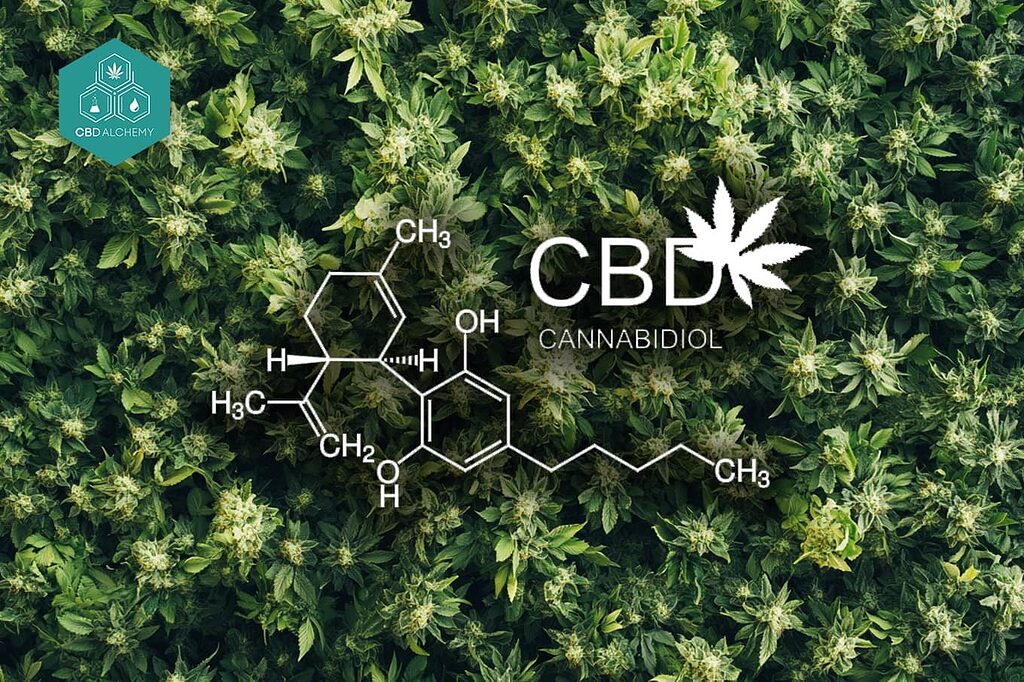
CBD, or cbd cannabidiol, is a non-psychotropic bioactive compound found in the Cannabis sativa plant. The cannabis plant contains more than 80 cannabinoids, of which CBD is one of the most important.
CBD can be obtained by extraction from the cannabis plant or through chemical synthesis. This compound has attracted the attention of the medical community and consumers because of its therapeutic properties, without the psychotropic effects associated with other cannabinoids such as THC.
Although CBD does not produce significant changes in behavior, mood or perception, its medicinal properties were officially recognized in 2020. This has allowed its use in a variety of medical treatments, highlighting its potential in modern medicine. It is important to obtain accurate information about CBD use, appropriate dosages and possible side effects.
Differences between CBD and THC
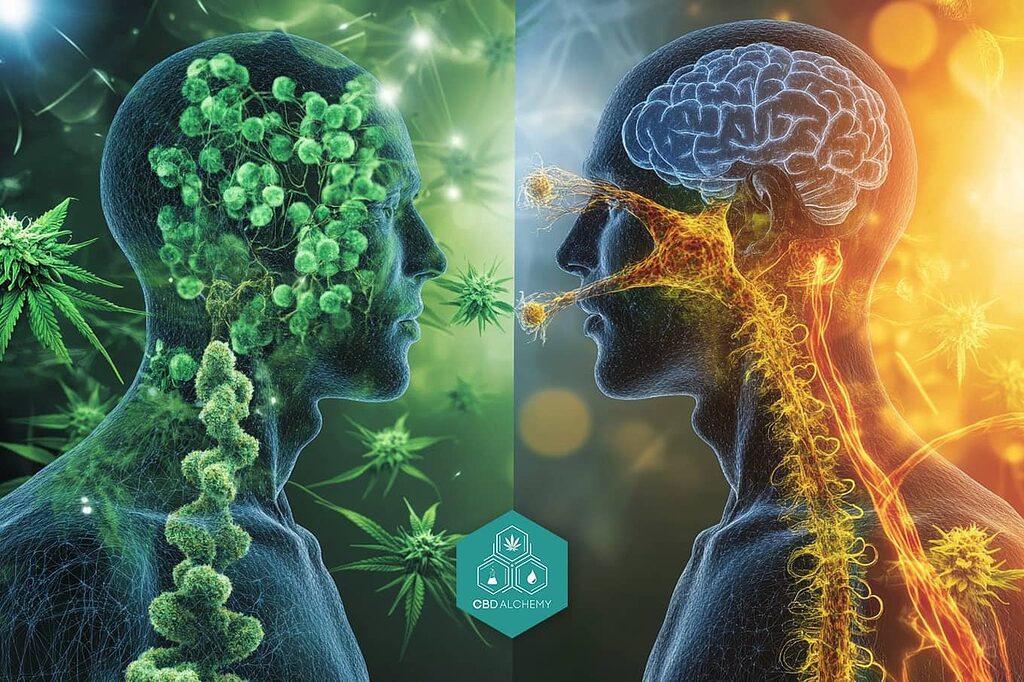
One of the main differences between CBD and THC is that CBD is not intoxicating, while THC is. CBD offers therapeutic benefits without causing alterations in mental perception, unlike THC, which is known for its psychoactive effects.
Therapeutically, THC is commonly used to relieve chronic pain and nausea, while CBD is known for its relaxing properties and ability to reduce seizures. Both cannabinoids account for up to 40% of Cannabis sativa extract, being the most abundant in the plant.
Hemp plants produce mostly CBD and almost no THC, while marijuana generates both cannabinoids. This difference in chemical composition is crucial in determining the use and legality of these products.
The legality of CBD and THC varies by country and use. Generally, THC is more restricted compared to CBD due to its psychoactive effects and its classification as a narcotic in many jurisdictions.
Benefits of CBD

CBD possesses a wide range of therapeutic properties including:
- analgesic
- anti-inflammatory
- anti-tumor
- anticonvulsant
- antipsychotic
- neuroprotective
These properties make it a viable option for treating a variety of health conditions.
Among the most common applications of CBD are relief from chronic pain, fibromyalgia, arthritis, Parkinson’s disease, schizophrenia, diabetes, obesity and multiple sclerosis. In addition, studies have shown that CBD can help with sleep-related problems and colitis.
Medical use of CBD has been approved to treat specific conditions such as certain epileptic syndromes in the U.S. and the European Union. Epidiolex is the only CBD product approved to treat rare forms of epilepsy, highlighting the importance of scientific validation to fully understand its benefits.
Anti-inflammatory and analgesic properties
CBD can be considered an effective therapeutic option for pain and inflammation relief thanks to its anti-inflammatory properties. It acts on the receptors of the endocannabinoid system, helping to regulate inflammation and thereby relieving pain.
CBD has been shown to be especially effective in conditions such as arthritis and autoimmune diseases, where inflammation and pain are common symptoms. These properties make CBD a promising alternative for the management of pain and inflammation in various pathologies.
Anxiety and stress reduction
CBD has the ability to modify blood flow patterns in regions of the brain responsible for stress and anxiety. By binding to the CB1 receptor in the brain, CBD can positively affect anxiety, pain and nausea.
During heroin withdrawal, CBD has been shown to decrease symptoms of anxiety and cravings, offering significant relief. In addition, CBD can mimic the effects of antidepressant medications at appropriate doses.
Doses of CBD that have been linked to anxiety reduction range from 300 mg to 600 mg, although there is no set perfect dose as it can vary from person to person.
Improving sleep and treating insomnia
The use of CBD can help regulate sleep cycles and improve sleep quality in people with sleep disorders. This regulation is crucial for those suffering from insomnia, as CBD offers effective relief to improve sleep quality.
In addition to regulating sleep cycles, CBD can also offer relief to those suffering from insomnia, providing a natural and effective solution to improve the quality of rest.
Ways to use CBD
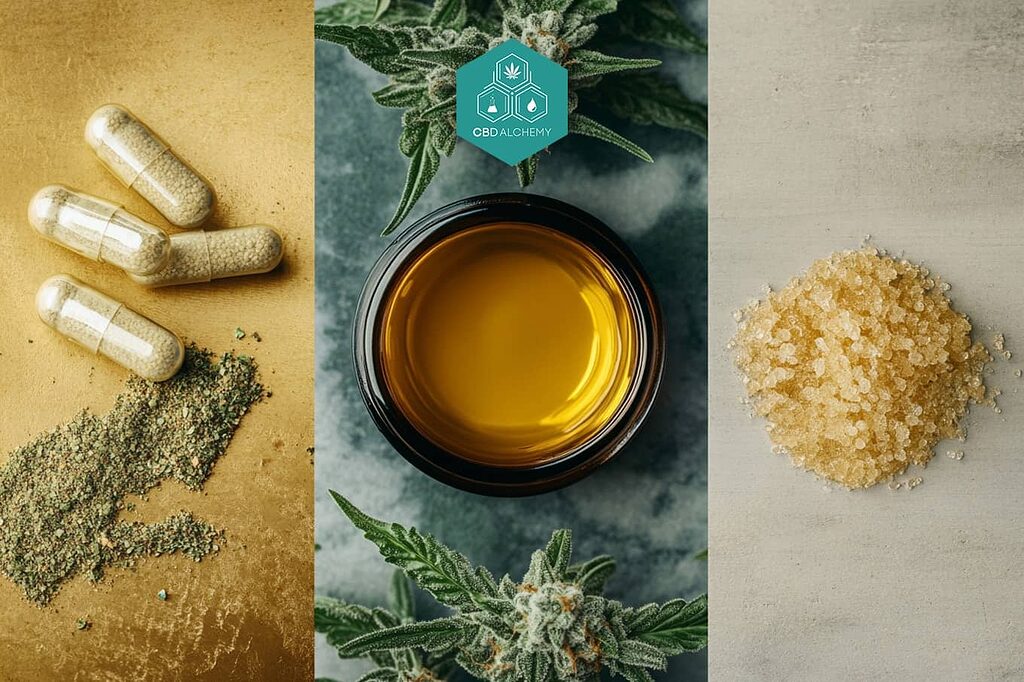
CBD can be consumed in a variety of ways, including:
- Orally
- Sublingual
- Topically
- Inhalation
Each version of these products offers different concentrations and delivery methods to suit individual needs.
CBD oils, for example, are commonly used sublingually and can also be added in food.
CBD crystals, which are a nearly pure isolate of cannabidiol, offer a versatile option for consumption. However, the purity and concentration of these products can vary, which could pose a risk of inaccurate dosing.
CBD oil
CBD oil is commonly consumed via sublingual ingestion, which involves placing the desired amount of drops under the tongue. For beginners, a dose of one drop per day is recommended for the first week.
The dose of CBD oil can be gradually increased according to the indicated program, especially to treat mild pain with a 5% concentration. It is important to leave the oil in the mouth for 60 seconds before swallowing for proper absorption.
To improve sleep quality, it is recommended to take CBD approximately one hour before bedtime. If taking more than 5 drops per day, it is best to spread the dose throughout the day to avoid side effects.
CBD capsules
The use of CBD capsules is popular due to their lack of taste and ease of dosing. The recommended starting dose for CBD capsules is usually one capsule per day, which contains approximately 6.4 mg of CBD.
For those who need a higher dose, it can be increased to three capsules per day. CBD capsules should be taken with water, which facilitates its consumption and absorption into the body.
Topical CBD products
Topical CBD products, such as creams and salves, are designed to relieve localized pain. These products can contain different forms of CBD, such as pure CBD, broad spectrum and full spectrum.
The use of cosmetic products containing CBD aims to relieve muscle or joint discomfort, offering a direct and effective application. The maximum recommended dose of CBD in cream is 200 mg per 100 ml of cream, ensuring an adequate amount for localized pain relief.
Dosage and recommended use
The dosage and recommended use of CBD can vary significantly depending on the individual and the purpose of use. It is essential to start with a low dose and gradually increase it until you find the amount that works best for each individual. CBD absorption is fast and efficient, allowing it to be used in a variety of forms, such as oil, capsules, creams and e-liquid.
For those who opt for CBD oil, it is recommended to start with a dose of one drop per day for the first week. This dosage can be gradually increased as needed, especially to treat mild pain with a 5% concentration. It is important to leave the oil in the mouth for 60 seconds before swallowing to ensure proper absorption.
CBD capsules are another popular choice due to their ease of dosing and lack of taste. The recommended starting dose is usually one capsule per day, containing approximately 6.4 mg of CBD. This dosage can be increased up to three capsules per day if needed.
Topical CBD products, such as creams and salves, are designed to relieve localized pain. These products can contain different forms of CBD, such as pure CBD, broad spectrum and full spectrum. The maximum recommended dosage of CBD in cream is 200 mg per 100 ml of cream, ensuring an adequate amount for localized pain relief.
In summary, it is crucial to adjust the CBD dosage according to individual needs and the type of product used. It is always advisable to start with a low dose and increase it gradually to avoid side effects and maximize therapeutic benefits.
Side effects of CBD
CBD can cause side effects such as:
- dry mouth
- diarrhea
- drowsiness
- low blood pressure
- decreased appetite
- mood swings
- dizziness
Although these effects are usually mild, it is important to be aware of them.
In some cases, CBD can cause lethargy, irritability and possible respiratory and urinary tract infections. Pregnant and lactating women, as well as people with liver disease and Parkinson’s disease, should avoid taking CBD.
People taking other medications should talk to their doctor before using CBD, as it may interact with other treatments. Also, those with liver disease may need lower doses due to the way the body processes CBD. It is crucial to get information from a healthcare provider before starting to use CBD.
Cautions and Warnings
When using CBD, it is essential to keep certain precautions and warnings in mind to ensure safe and effective use. Although CBD is generally well tolerated, it can cause side effects such as dry mouth, low blood pressure, grogginess, and drowsiness. In addition, signs of liver injury have been reported with high doses of the prescription form of CBD, known as Epidiolex.
It is critical to consult with a physician before beginning CBD use, especially if you are taking other medications or have any pre-existing medical conditions. CBD may interact with other treatments, which could alter their effectiveness or increase the risk of side effects.
Following dosage instructions is crucial to avoid problems. The recommended dosage should not be exceeded, and it is important to be aware of possible side effects. If severe symptoms are experienced, medical attention should be sought immediately.
It is important to remember that CBD is not an FDA approved medication and should not be used as a replacement for established medical treatments. It is always advisable to consult with a healthcare professional before incorporating CBD into any treatment regimen, especially for those with pre-existing medical conditions or who are taking other medications.
In conclusion, although CBD offers numerous therapeutic benefits, it is essential to use it with caution and under the supervision of a physician to ensure its safety and effectiveness.
Legality of CBD in Spain
CBD is considered legal in Spain as long as its THC content does not exceed 0.2%. If the product exceeds this limit, it is classified as marijuana and is subject to stricter regulations.
As of January 2019, CBD is classified as a novel food in the EU, which limits its sale to food supplements and not as medicines. Although there is no specific law in Spain regulating the production or consumption of CBD, the situation is interpreted through international regulations.
Scientific studies on CBD

Despite the promotion of CBD, the evidence on its effectiveness on conditions such as anxiety and pain is still not sufficient in quality. Research on the benefits of CBD for anxiety and multiple sclerosis remains limited.
However, CBD has been documented to reduce the number of seizures, as well as their severity and frequency in patients with epilepsy who consume it under prescription. In addition, CBD can help limit the side effects of chemotherapy, reduce pain, and improve appetite and mood in cancer patients.
Other studies have shown that CBD can improve quality of life parameters in patients with Parkinson’s disease and has documented analgesic and anti-inflammatory effects. The concept of the ‘entourage effect’ suggests that consuming cannabinoids and terpenes together can enhance their positive effects on the body.
Summary
CBD, or cannabidiol, offers a wide range of therapeutic benefits, from anti-inflammatory and analgesic properties to reduced anxiety and improved sleep. These benefits have been supported by scientific studies, although the quality of the evidence still needs improvement.
It is crucial to be aware of the possible side effects of CBD and to consult a doctor before use, especially for people taking other medications or belonging to risk groups. The legality of CBD in Spain allows its use as long as the THC content does not exceed 0.2%, which offers an accessible option for those seeking natural alternatives.
In conclusion, CBD represents a promising option in the field of natural medicine. With further research and proper regulation, it may become an even more valuable tool for improving our health and well-being.
Frequently Asked Questions
What is CBD?
CBD, or cannabidiol, is a natural compound of the cannabis plant that lacks psychoactive effects and is recognized for its therapeutic properties. Its use has gained popularity in the field of health and wellness.
What are the benefits of CBD?
CBD offers multiple benefits, including pain relief, anxiety reduction, improved sleep quality and treatment of some epileptic syndromes. These positive effects make it a viable option for many people seeking natural alternatives to improve their well-being.
What are the side effects of CBD?
Side effects of CBD can include dry mouth, diarrhea, drowsiness, low blood pressure, decreased appetite, and dizziness. It is important to be informed about these possible effects before using it.
Is CBD legal in Spain?
Yes, hemp-derived CBD with THC levels below 0.2% is legal in Spain.
What is the difference between CBD and THC?
The main difference between CBD and THC lies in their effects: CBD is not intoxicating and provides therapeutic benefits, while THC has psychoactive effects and can alter mental perception.
